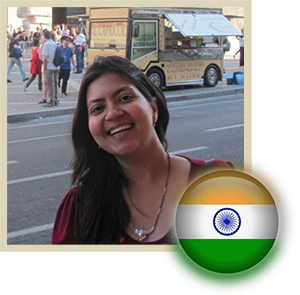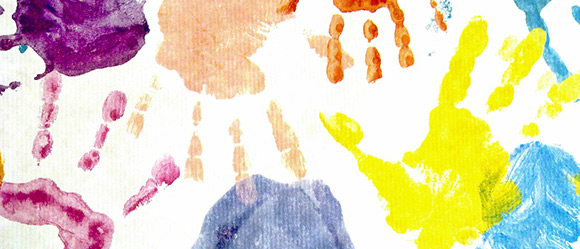East and West – An Indian Adjusting to Life in the States
This is a guest post by Ritu from India.
Before I started writing this article, I watched some videos on youtube and browsed through books that talked about cultural differences. I was trying to get a hook, a starting point, to begin describing some aspects of my own experience of what it means to be an Indian living in the United States. It’s an experience that’s difficult to put into words, and difficult to talk about in a nuanced way.
If you are someone who is thinking of moving to the States, you have probably been thinking about and imagining your life here. Maybe there’s an opportunity that has come up, and you are not quite sure. On the one hand, it’s a fabulous opening-up of an entire new world. On the other, you are aware of the risks involved. You will be replanting your entire life into a new terrain, and while that could be exciting, it could also be very challenging.
Maybe something that I have learned in my three years here might provide some small, missing piece for you. It might help you visualize what your own experience might look like.
So, here are some things that I have learned while living in the heart of Silicon Valley. Because America is as diverse a place as any other, that is also something to keep in mind. This is what life looks like for me here, right now. It’s likely that if I lived in Washington D.C. or Austin or someplace else, my life would take a similar, but different form.
We are all shaped by place
The biggest thing that strikes me after three years here is how much we are shaped by the place we live in. We think we are self-determining, but that’s not completely true. A small, often-given example is that it is normal and easy to chat with a server here in a restaurant. That’s not something you would even think of doing in a restaurant in Delhi, for example.
Although I wholeheartedly believe in equality, the last time I tried to do that in an upscale Delhi restaurant (after staying here and visiting India), I was met with looks of puzzlement. It took me a very short time to understand that I needed to adjust my behavior. Not only was I someone from a different social class, but also a woman trying to do it. My behavior was shaped by social norms.
Of course, this does not apply to all people and every place in India, but that’s the general way of being in many, many places.
So, why is this important? As you experience these small (really big) differences in the way life happens here, your are now aware that a lot of who you are, is in fact, malleable. Your personality is no longer fixed. That realization, that change, even when it’s good, can be disorienting.
As immigrants, we are challenged to form new identities
Shifting countries means you are shifting contexts (of course!). Earlier, the people around you knew where you came from, what your experiences might have been like. Now, they simply don’t. When I first came here, I was surprised that I was not considered “Asian,” but belonged to the separate category of “Indian,” even though I was from South-east Asia. I was also brown, something I had never even thought of before. The word irritated me no end.
 I also belonged to this dynamic community that is one of the most successful immigrant groups in the States. Because of that, some people thought that I was very intelligent (I am!) and really good at Maths (not at all!). While some of this struck me as ignorant sometimes, the more I stay here, the more I realize that these are things you can’t take personally. How much do I, for that matter, know about America or the other cultures that make Silicon Valley such an inclusive place? Just like Americans might not know a lot about India, I know very little about China, Vietnam or Korea, all large communities in the Valley.
I also belonged to this dynamic community that is one of the most successful immigrant groups in the States. Because of that, some people thought that I was very intelligent (I am!) and really good at Maths (not at all!). While some of this struck me as ignorant sometimes, the more I stay here, the more I realize that these are things you can’t take personally. How much do I, for that matter, know about America or the other cultures that make Silicon Valley such an inclusive place? Just like Americans might not know a lot about India, I know very little about China, Vietnam or Korea, all large communities in the Valley.
As a person who comes from a different country, I have to clearly communicate who I am and be open to learning about the other person. When we don’t have enough exposure, it is easy to stereotype people. All we can see about them are fragments of what it clearly visible.
In the beginning, when you are already feeling lonely and struggling to build a life and make friends, cultural mis-typings can leave you feeling uprooted. But as you stay here, you might realize something that I am beginning to. You can have a lot more in common with someone who is born in a different country and seems very different from you on the outside than someone who shares your culture but thinks nothing like you.
And yet, culture is important and cultural differences are real.
Recently, I came across an example of cultural differences that deeply resonated with me. It is from a book by Stuart Diamond, a Pulitzer-prize winning reporter. He talks about an interesting study about the misinterpretation of a smile. It was conducted on a college campus and this is how some of it went:
“Two Americans passed each other on a walkway and smiled at each other. Both felt good about this. Then, an American passed a Korean student. The American smiled; the Korean student did not. The Korean student thought, “These Americans are so superficial. All they do is smile, even at strangers. It means nothing to them.” The American student thought, “These Koreans are so unfriendly.”
An Arab student walked along a path in traditional garb, wearing a white flowing robe. People smiled at him in approval. But he felt only ridicule–because that’s what smiling means in some Arab cultures in such a context. He quickly ran into the bathroom to check how he looked.”
If just a simple smile can be the basis for such misunderstanding, think about what could happen when we talk at cross-purposes or when emotions are involved. Just the force of the transition, being in an unfamiliar place, might cause us to cling fiercely to what we think our belief system is, and nudge us to start thinking in “us versus them” terms.
That’s the challenge of culturally adjusting to a new country. We are asked to open ourselves enough to actually learn something from this new space that we are entering. Yes, change does mean loss. Our identities are in flux, and the ways we relate to family and friends back home has been changed forever. But if we have decided to make the shift in spite of the difficulties, it’s because we see the promise of something else that’s very positive for us.
As a country, America has helped me find my voice as a writer. It resonates with that part of me that is fiercely individualistic. I find value in the fact that you can disagree here, and still belong. I am creating a new home here, on top of the structure of the old home that will always exist inside me.
Being an immigrant is an ever-changing movement, like everything else. There’s no way to have any guarantees. So, when you think about your decision, turn it over on all sides and ask yourself what is it that you really want, what is it that you are really trying to reach for?
 More about the author:
More about the author:
Ritu is an Indian expat and writer living in the San Francisco Bay Area, California. Visit her blog at WalkingThroughTransitions.com where she talks about sensitivity and the challenges of living as a Highly Sensitive Person (HSP).






Leave a Reply